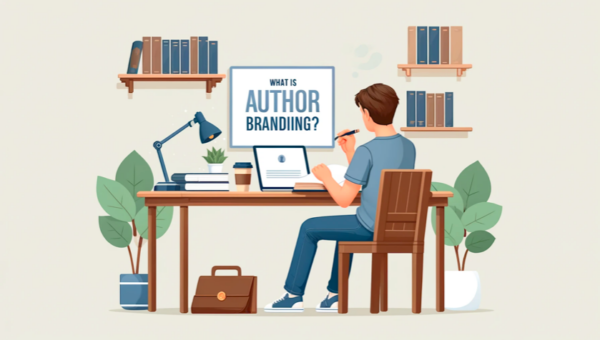Embarking on the journey to becoming a published author is a dream laden with both aspiration and trepidation. Debut authors, armed with stories waiting to be told, often find themselves navigating a labyrinth of challenges—from the daunting task of completing a manuscript to the uncertainties of the publishing market.
The question of “Will my book ever see the light of day?” looms large, casting a shadow of doubt over even the most confident of writers. This article seeks to shed light on this very query by delving into the world of debut author statistics.
We aim to provide an analysis of the real odds of getting published, breaking down the numbers and exploring what they signify for first-time authors. By examining data on book deals, publication rates, and the journey of self-published books from manuscript to bookstore shelf – we offer insights into the publishing landscape that awaits those daring to make their debut.
Your Publishing Journey Awaits – Start NowDebut Author Statistics: A Closer Look
Delving into the realm of debut author statistics offers a revealing glimpse into the heart of the publishing industry. The available data, though scattered, presents a narrative of fierce competition between high-quality manuscripts and slim odds, with thousands of manuscripts vying for the attention of publishers each year. Despite the daunting numbers, a significant portion of debut novels do make it to publication, illuminating a path of hope for aspiring authors. Annually, the number of debut novels gracing the shelves varies widely, influenced by market trends, certain genre popularity, and publishing houses’ strategic decisions. This fluctuation underscores the unpredictable nature of the industry, where timing can be as crucial as talent.
The role of literary agents in this journey cannot be overstated. These gatekeepers of the literary world act as crucial intermediaries, using their expertise and connections to bridge the gap between authors, writers, and publishers. A good agent not only provides writers with invaluable guidance on refining and writing a manuscript but also champions the author’s work, negotiating deals and advocating for the best possible terms of book deals. For many debut writers, securing representation can be a pivotal moment, significantly enhancing their chances of getting their first book published and marking a crucial step toward realizing their literary aspirations.
Quick Summary: The Real Odds of Getting Published as a Debut Author
Embarking on the journey to become a published author is fraught with challenges, yet many debut authors successfully navigate this complex landscape each year. Despite the highly competitive nature of the publishing industry, the path to publication is not impossible. The odds of getting published are influenced by several factors, including the quality of the manuscript, market trends, genre popularity, and the strategic efforts of literary agents.
Annually, the number of debut novels published varies, reflecting the industry’s dynamic nature. Literary agents play a crucial role in this journey, acting as intermediaries between authors and publishers. They refine manuscripts, pitch to publishers, and negotiate contracts, significantly enhancing an author’s chances of getting published.
The journey to publication involves several stages: initial inspiration, disciplined writing, meticulous revision, and strategic pitching. Securing representation from a literary agent is a pivotal step that can make a significant difference. Rejection is a common part of the process, but persistence and continuous improvement are key.
For those considering self-publishing, this path offers greater control and potentially higher royalties but requires authors to manage editing, design, and book marketing independently. Hybrid publishing models are also emerging, blending the strengths of both traditional and self-publishing.
Ultimately, the success of a debut novel can greatly impact an author’s career, paving the way for future publications. Aspiring authors should embrace resilience, adaptability, and a commitment to their craft. With dedication, the dream of seeing their book on the shelves is achievable.
The Journey to the First Novel
The journey to write the first novel begins with that initial spark of inspiration, a compelling idea that sets the author expect entire creative process in motion. This inspiration can emerge from various sources, whether it’s a personal anecdote yearning to be shared, speculative musings on existential questions, or the rich tapestry of history begging for a narrative voice. This phase is where the seed of the debut novel is sown, ready to be nurtured into a full-fledged story.
Once the flame of inspiration is lit, the writer embarks on the demanding yet rewarding phase of actual writing. This stage is characterized by the meticulous development of the story’s framework—character arcs are sculpted, settings are built, and plots are intricately woven. The writer’s commitment to a disciplined routine and the persistence to keep pushing forward, even when faced with creative blocks, is crucial during this period.
Refinement and Revision: Polishing Your Narrative
With the completion of the first draft, the writer enters the critical phase of revision. This is where the narrative is fine-tuned, and the prose is polished, ensuring that the story flows seamlessly and engages the reader. Revisiting the manuscript with a critical eye, the author refines the work to enhance its clarity, pacing, and emotional resonance.
Constructive feedback from various beta readers and writing groups provides fresh perspectives that are vital for the manuscript’s growth. This stage involves sharing the work with trusted individuals who can offer insightful critiques and encouragement, helping at least one novel writer to identify and rectify any narrative shortcomings.
The Art of Pitching: Capturing the Essence of Your Story
Transitioning from writer to salesperson, the author must now craft compelling pitch materials. A well-written query letter and a succinct synopsis are key to grabbing the attention of literary agents and publishers, summarizing the essence and marketability of the novel in a way that entices them to read more.
Identifying and approaching literary agents and publishers who align with the novel’s genre and style is a strategic endeavor. Tailoring submissions to meet the specific preferences and submission guidelines of each potential partner increases the chances of making a lasting impression.
The submission process is often met with rejection, a challenging but integral part of the publishing journey. Each rejection serves as an opportunity to refine the pitch or manuscript, moving one step closer to acceptance.
Forming Strategic Alliances: The Role of Literary Agents
Securing representation from a literary agent is a significant milestone in an author’s journey. A good agent not only advocates for the novel but also collaborates with the author to fine-tune the manuscript, ensuring it’s in its best form for publisher submissions.
Amid the rigorous process of writing, revising, and pitching, authors need to acknowledge and celebrate their progress. Each completed draft, a piece of positive feedback, is one step forward in the submission process and is a victory on the path to publication.
The journey to publishing a first novel is marked by numerous challenges, including the stark reality that success often comes after multiple attempts. The quality of the manuscript and the author’s resilience play crucial roles in overcoming these obstacles, with the support of a literary agent often being pivotal in navigating the complex publishing landscape.
Your Publishing Journey Awaits – Start NowBeyond the First Novel: The Path to Publication
The path to publication does not end with the debut novel, for many authors, the initial publication of their novel marks the beginning of a new set of challenges and opportunities. Statistics indicate that the journey from debut to subsequent seven or more books or novels is fraught with its own set of hurdles, with a significant drop-off in the number of authors who manage to publish at least one novel before a second or third book. The reasons are manifold—market demands, publisher expectations, and the personal growth of the author all play critical roles in this progression.
The success, or lack thereof, of the first novel, heavily influences an author’s career trajectory. A well-received debut can open doors, making publishers more inclined to invest in an author’s future works. Conversely, a lukewarm reception might necessitate a more arduous path to subsequent publications, often requiring authors to reinvent their approach or explore new genres.
Within this landscape, “serious contenders”—authors deeply committed to their craft and career—often distinguish themselves by their resilience and adaptability. These individuals view writing not just as a passion but as a profession, continuously evolving their skills and understanding of the industry. They are more likely to invest in professional development, seek constructive feedback, and adapt to the changing market trends, thereby increasing their chances of a sustained and successful writing career. For these authors, each novel is a stepping stone, with lessons learned and experiences gained contributing to their growth and eventual success in the competitive world of publishing.
The Traditional Publishing Route vs. Self-Publishing
The publishing and writing landscape presents two primary pathways for debut authors: traditional publishing and self-publishing, each with its unique set of challenges and opportunities. Traditionally published authors and writers often benefit from the prestige, support, and distribution networks of established publishing houses. However, breaking into this realm can be daunting, with debut author statistics revealing stiff competition for a limited number of book deals. Advances in traditional publishing can vary widely, with new authors writing many similar books often receiving lower sums, contingent on the publisher’s assessment of the first book’s market potential.
Conversely, self-publishing has democratized the process, allowing more authors to bring their work to readers without the gatekeeping of traditional publishers. While this path offers greater creative control and potentially higher royalties per book, it lacks the structured support of a major publisher system, requiring authors to navigate editing, design, marketing, and distribution on their own. Publication rates are significantly higher in the self-publishing realm, given the lower barriers to entry, but this also means greater responsibility on the author to ensure their book’s quality and visibility.
The evolving publishing landscape, influenced by digital platforms found online, and changing reader habits, is reshaping how debut authors approach their careers. Hybrid models are emerging, blending the strengths of both paths and offering authors more flexibility in how they publish and market their short stories and books. This shift underscores the importance of adaptability and resilience for debut authors navigating their way through the complex and ever-changing world of publishing.
Conclusion and Advice for Aspiring Authors
Navigating the journey to becoming a published author is undeniably challenging, with the odds reflecting a competitive landscape filled with both hurdles and opportunities. However, the stories of those who have succeeded serve as a testament to the possibility of turning literary aspirations into reality.
For aspiring authors, persistence, continuous improvement, and adaptability are key. Embrace rejection as a stepping stone, remain committed to refining your craft, and stay informed about the evolving publishing industry. Remember, every published author was once a debutant. Let your passion for storytelling drive you forward, and keep in mind that with dedication and resilience, the dream of seeing your name on a book cover is well within reach.
Ready to Publish Your Book?
If you’ve brought your book to its final flourish and are ready to share it with the world, Spines is your next step. Embrace the future of publishing with Spines, where our AI-driven platform transforms your writing journey. From meticulous editing and proofreading to captivating cover design, and from seamless distribution to strategic marketing across all channels and platforms, Spines ensures your book transcends the ordinary.
Your Publishing Journey Awaits – Start NowFAQ: Analyzing Debut Author Statistics and the Odds of Getting Published
Q1: How difficult is it for a debut author to get published?
A1: The publishing industry is highly competitive, with thousands of manuscripts submitted to publishers and literary agents every year. While it’s challenging, many debut authors do get published annually, indicating that with the right approach and quality of work, it is certainly possible.
Q2: How many debut novels are published each year?
A2: The number of debut novels published annually varies widely and can be influenced by factors such as market trends, genre popularity, and publishing house strategies. The exact numbers can fluctuate each year, making it important for authors to research current trends.
Q3: What role do literary agents play for debut authors?
A3: Literary agents act as intermediaries between authors and publishers. They provide critical support by refining manuscripts, pitching to publishers, and negotiating contracts. Having an agent significantly increases a debut author’s chances of getting published.
Q4: How many novels does an author typically write before getting a book deal?
A4: There’s no set number, but it’s not uncommon for authors to write multiple novels before securing a book deal. Persistence and continued improvement are key, as each manuscript provides valuable learning experiences.
Q5: Is self-publishing a viable option for debut authors?
A5: Yes, self-publishing is a viable path and has become increasingly popular due to its accessibility. It offers authors more control over the publishing process and higher royalties per book, but it also requires them to take on responsibilities typically handled by traditional publishers, such as editing, design, and marketing.
Q6: What impact does the success of a first novel have on an author’s career?
A6: The success of a writer’s first novel can significantly impact an author’s career by establishing their reputation, making it easier to publish future works. However, authors should continue to hone their craft and adapt to market demands to maintain and build upon their initial success. First time authors should consider researching marketing strategies.
Q7: What are some common reasons debut novels are rejected by publishers?
A7: Common reasons include a mismatch with the publisher’s genre or style preferences, market saturation for the book’s theme, lack of originality, or issues with the manuscript’s quality, such as poor writing, underdeveloped characters, or inconsistent pacing.
Q8: Can debut authors expect to receive a book advance, and if so, how much?
A8: While some debut authors do receive advances, the amounts can vary widely based on the publisher’s size, the book’s market potential, and negotiation by the author or their agent. Advances for debut authors tend to be lower than those for established authors.
Q9: What advice would you give to aspiring debut authors?
A9: Aspiring authors should focus on honing their craft, being persistent in the face of rejection, and remaining adaptable to feedback and market trends. Building a network, researching potential agents and publishers thoroughly, and considering all publishing paths, including self-publishing, are also important steps.
Q10: Are there specific genres that are more accessible for debut authors?
A10: Accessibility can vary based on current market trends and demands. However, genres such as young adult fiction, romance, and thriller often see a steady demand. Researching and understanding the current market is crucial for identifying opportunities within specific genres.








